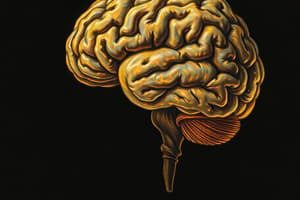Podcast
Questions and Answers
What does cognitive flexibility primarily involve?
What does cognitive flexibility primarily involve?
- The ability to create fixed plans for tasks
- The ability to recall information quickly
- The ability to adapt responses to changing situations (correct)
- The ability to rigidly follow established strategies
Which assessment method is NOT mentioned for evaluating planning and organization?
Which assessment method is NOT mentioned for evaluating planning and organization?
- Key Search Test
- Cognitive Mapping (correct)
- Clock Drawing
- Rey Complex Figure Test
Patients with poor cognitive flexibility often exhibit which behavior?
Patients with poor cognitive flexibility often exhibit which behavior?
- Adaptable thinking based on context
- Easily switch between tasks
- Rigid and concrete thinking (correct)
- Ability to consider multiple viewpoints
A characteristic of individuals who struggle with planning and organization includes which of the following?
A characteristic of individuals who struggle with planning and organization includes which of the following?
What does the Trail Making Test assess?
What does the Trail Making Test assess?
Which impairment is most closely associated with the dorsolateral prefrontal cortex?
Which impairment is most closely associated with the dorsolateral prefrontal cortex?
What describes a common issue with neuropsychological assessments of executive functioning?
What describes a common issue with neuropsychological assessments of executive functioning?
What is a key characteristic of poor inhibitory control?
What is a key characteristic of poor inhibitory control?
What is involved in the concept of planning and organization?
What is involved in the concept of planning and organization?
Which of the following is NOT a characteristic of orbitofrontal prefrontal cortex syndromes?
Which of the following is NOT a characteristic of orbitofrontal prefrontal cortex syndromes?
What is the primary role of executive functions in cognition?
What is the primary role of executive functions in cognition?
Which of the following is NOT considered an aspect of executive functioning?
Which of the following is NOT considered an aspect of executive functioning?
How does damage to the frontal lobes typically affect executive functioning?
How does damage to the frontal lobes typically affect executive functioning?
Which of the following can be classified as higher-level cognitive skills within executive functioning?
Which of the following can be classified as higher-level cognitive skills within executive functioning?
What is a key characteristic of executive functions as defined in the content?
What is a key characteristic of executive functions as defined in the content?
Which skill is least likely to be affected in patients with impaired reasoning and problem solving?
Which skill is least likely to be affected in patients with impaired reasoning and problem solving?
What does the nature of executive functioning impairments following traumatic brain injury depend on?
What does the nature of executive functioning impairments following traumatic brain injury depend on?
Which of the following is a common symptom of frontotemporal dementia?
Which of the following is a common symptom of frontotemporal dementia?
Patients with schizophrenia may struggle notably with which executive functioning aspect?
Patients with schizophrenia may struggle notably with which executive functioning aspect?
Which task would most likely assess reasoning based on nonverbal information?
Which task would most likely assess reasoning based on nonverbal information?
Which of the following abilities is specifically indicated as impaired in individuals with reasoning difficulties?
Which of the following abilities is specifically indicated as impaired in individuals with reasoning difficulties?
What characterizes the behavioral changes seen in patients with frontotemporal dementia?
What characterizes the behavioral changes seen in patients with frontotemporal dementia?
What is a common consequence of impaired reasoning in individuals with brain injuries?
What is a common consequence of impaired reasoning in individuals with brain injuries?
Which are tests of inhibition? (Select all that apply)
Which are tests of inhibition? (Select all that apply)
Which of these tests assess planning and organization abilities? (Select all that apply)
Which of these tests assess planning and organization abilities? (Select all that apply)
Which are tests of cognitive flexibility? (Select all that apply)
Which are tests of cognitive flexibility? (Select all that apply)
Which tests assess concept formation, reasoning and problem solving?
Which tests assess concept formation, reasoning and problem solving?
What can cause impairment in executive functioning?
What can cause impairment in executive functioning?
Cognitive inflexibility, poor problem solving and apathy are associated with deficits in:
Cognitive inflexibility, poor problem solving and apathy are associated with deficits in:
Impulsivity, emotional lability, and distractibility often result from deficits in:
Impulsivity, emotional lability, and distractibility often result from deficits in:
Apathy, emotional blunting, and poor decision making can indicate impairment in the:
Apathy, emotional blunting, and poor decision making can indicate impairment in the:
A lack of awareness is a primary characteristic of deficits in the:
A lack of awareness is a primary characteristic of deficits in the:
What is a key feature of frontal lobe syndromes?
What is a key feature of frontal lobe syndromes?
A form of dementia involving early and progressive changes in personality, and significant deficits in executive functioning is:
A form of dementia involving early and progressive changes in personality, and significant deficits in executive functioning is:
The most common form of frontotemporal dementia is:
The most common form of frontotemporal dementia is:
Flashcards
Executive Functioning
Executive Functioning
Self-regulatory functions that organize, direct, and manage cognitive abilities, emotions, and behaviors.
Inhibition (Executive Function)
Inhibition (Executive Function)
The ability to control impulses and resist distractions.
Planning & Organization (Executive Function)
Planning & Organization (Executive Function)
The ability to create a plan and put it into action.
Cognitive Flexibility (Executive Function)
Cognitive Flexibility (Executive Function)
Signup and view all the flashcards
Frontal Lobes & Executive Function
Frontal Lobes & Executive Function
Signup and view all the flashcards
Frontal Lobe Syndromes
Frontal Lobe Syndromes
Signup and view all the flashcards
Inhibition
Inhibition
Signup and view all the flashcards
Stroop Test
Stroop Test
Signup and view all the flashcards
Planning & Organisation
Planning & Organisation
Signup and view all the flashcards
Neuropsychological Assessment executive functioning problems
Neuropsychological Assessment executive functioning problems
Signup and view all the flashcards
Planning & Organization
Planning & Organization
Signup and view all the flashcards
Cognitive Flexibility
Cognitive Flexibility
Signup and view all the flashcards
Clock Drawing (assessment)
Clock Drawing (assessment)
Signup and view all the flashcards
Rey Complex Figure Test
Rey Complex Figure Test
Signup and view all the flashcards
Reasoning, Concept Formation, & Problem Solving
Reasoning, Concept Formation, & Problem Solving
Signup and view all the flashcards
Problem Solving Strategies
Problem Solving Strategies
Signup and view all the flashcards
Concept Formation
Concept Formation
Signup and view all the flashcards
Reasoning: Verbal
Reasoning: Verbal
Signup and view all the flashcards
Reasoning: Nonverbal
Reasoning: Nonverbal
Signup and view all the flashcards
Traumatic Brain Injury (TBI)
Traumatic Brain Injury (TBI)
Signup and view all the flashcards
Frontotemporal Dementia
Frontotemporal Dementia
Signup and view all the flashcards
Schizophrenia Impact
Schizophrenia Impact
Signup and view all the flashcards
Assessment of Reasoning
Assessment of Reasoning
Signup and view all the flashcards
Study Notes
Executive Functioning
- Executive functions are self-regulatory functions that organize, direct, and manage other cognitive abilities, emotional responses, and behavior. (Burgess and Alderman, 2004)
- They are a complex set of processes allowing a person to plan and carry out goals, adapt to new situations, and consider consequences.
- They are higher-level cognitive skills.
Aspects of Executive Functioning
- Inhibition: The ability to withhold automatic responses and respond in a novel (or less automatic) manner. Patients with poor inhibitory control may be impulsive, show little self-control, and display inappropriate social behaviour. Assessment measures include the Stroop Test and sentence completion test.
- Planning and Organization: Identifying steps and elements to achieve a goal. It involves imagining future situations, weighing different options, and making choices. Assessment includes tests like the Clock Drawing test, Rey Complex Figure test and Key Search test. Patients with poor planning may adopt a haphazard approach to tasks, not think ahead, and not consider options.
- Cognitive Flexibility: The ability to switch between different ways of responding, adapting to changing situations. Patients with poor flexibility may exhibit rigid and concrete thinking, and perseverative responding, making it difficult to understand other viewpoints. Assessment includes the Trail-Making Test, Clock Drawing, and Sorting Task.
- Concept Formation, Reasoning, and Problem Solving: Developing new concepts, strategies, using learned concepts to solve a problem, evaluating performance, considering alternatives, and thinking logically. Patients with problems in these areas may struggle to form categories, generate and implement solutions, correct errors, and use feedback. The assessment for this area can include verbal fluency tasks, spatial anticipation tasks, and reasoning based on nonverbal information.
Executive Functioning and the Frontal Lobes
- Executive functions frequently relate to the frontal lobes. Although damage often impairs executive functions, these impairments are not always confined to the frontal lobe, and executive function isn't synonymous.
- Most patients with frontal lobe damage do show impairments of executive functioning, however.
- Specific parts of the frontal lobe (i.e., dorsoalateral, orbitofrontal, and ventromedial prefrontal cortex) are linked to specific aspects of executive function.
Conditions Affecting Executive Functioning
- Traumatic Brain Injury (TBI): Impairments are common as frontal lobes are vulnerable. Nature and severity depend on injury location.
- Frontotemporal Dementia: Characterized by early and progressive changes in personality, behaviour, and executive functioning, such as disinhibition, impulsivity, mental rigidity, poor insight, loss of empathy, and apathy.
- Schizophrenia: Significant impairments in executive functioning compared to controls and other psychiatric groups; also characterized by poor cognitive flexibility, impaired planning, and poor insight.
Studying That Suits You
Use AI to generate personalized quizzes and flashcards to suit your learning preferences.




